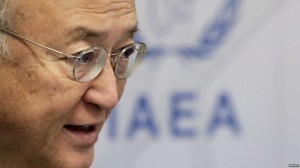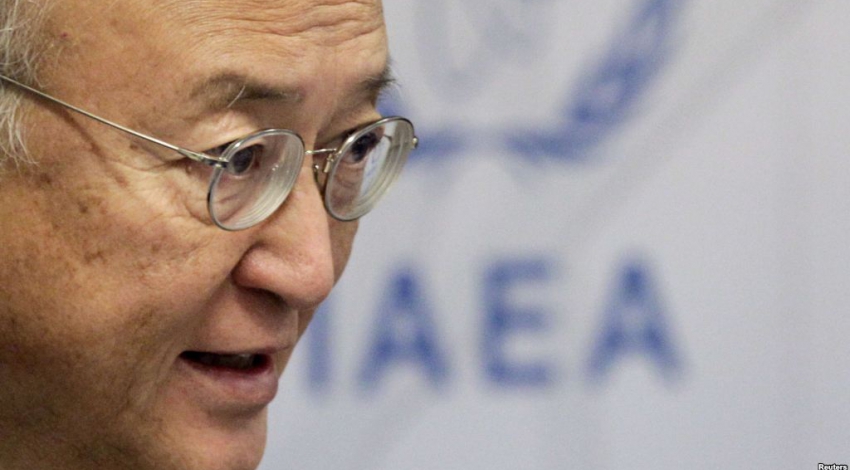
VIENNA: Iran is on the threshold of being able to significantly ramp up production at its most controversial nuclear plant, diplomats expect the UN nuclear agency to say in a new report on Friday.
The International Atomic Energy Agency (IAEA) will outline that despite sanctions, Iran's engineers have now fully fitted out the Fordo enrichment facility, dug into a mountain near the holy city of Qom, envoys told AFP.
The findings will likely be read with alarm in Israel, the Middle East's sole if undeclared nuclear weapons state, which has refused to rule out bombing Iran to stop it from also getting the bomb.
Also taking an interest will be the "P5+1" world powers -- the US, China, Russia, Britain, France and Germany -- thought to be about to resume talks in early 2013 at the latest now that the US election is over.
Fordo, which Iran only revealed the existence of to the IAEA in 2009, began operation in 2011, enriching uranium to 20-per cent purities -- close to the level needed for the fissile core of a nuclear weapon.
The last IAEA report in August said that Iran had doubled the number of centrifuges -- which spin uranium gas at supersonic speeds to increase the proportion of a fissile isotope -- to around 2,000.
Only around 700 were in operation, however, a figure that is not thought to have changed.
Now though the full 2,700 centrifuges are expected to have been installed, allowing for a dramatic increase in output, which one envoy said might begin after an annual IAEA inventory of the site at the end of November.
"Between now and March I think you will see an increase in productivity at Fordo," the Western diplomat told AFP on condition of anonymity. "By the time we get to the February IAEA report, we are going to be talking about an x-percentage increase in enrichment."
Iran says that Fordo is for peaceful purposes, and indeed the August IAEA report said that Tehran had converted a considerable part of its stockpile of 20-per cent uranium for use in a research reactor.
Many in the international community worry however that by the time Fordo is fully up and running, Iran will be producing far more 20-per cent-enriched uranium than Iran's civilian nuclear activities can conceivably need.
"We are going to be seeing a very considerable, uninterrupted build-up of enrichment capacity ... far exceeding any need that Iran could justify on the basis of its research reactor programme," nuclear expert Mark Hibbs at the Carnegie Endowment for International Peace told AFP.
The IAEA repeatedly says in its regular reports that a lack of Iranian cooperation means that it is "unable... to conclude that all nuclear material in Iran is for peaceful purposes."
As a result, the UN Security Council has passed six resolutions calling on Iran to suspend all enrichment, including to lower levels, passing four rounds of sanctions.
Western nations have imposed additional sanctions that this year have begun to hit the Iranian economy hard.
"It still remains the case that Iran has still not formally declared to the IAEA what it intends to do specifically with any of the enriched uranium it is producing at Fordo," a second Western envoy said.
"Whatever Iran tries to do on the margins to make it appear that it doesn't have a nuclear weapons programme, it is not that we are not appreciative of that, but it doesn't get to the heart of the matter."
Possible military dimensions
A nuclear bomb needs more than uranium, and exactly a year ago the IAEA released a major report setting out a large body of "overall, credible" evidence suggesting activity in the other areas, at least until 2003 and possibly since.
Twelve months on, and despite a string of fruitless meetings in Vienna and Tehran, Iran continues to reject the material in that report, dismissing them as forgeries provided by foreign intelligence services.
In September the head of Iran's atomic agency, in a speech at the IAEA's annual meeting of all member states, accused the UN body of being infiltrated by saboteurs and "terrorists".
However IAEA head Yukiya Amano expressed guarded optimism on Sunday during a visit to Baghdad that the next meeting, set for December 13 in the Iranian capital, will be more productive.
"It is in the interests of Iran, and for the international community, and that is why I believe that there is some good reason that Iran will get cooperative for us," he said.
The Iran Project is not responsible for the content of quoted articles











